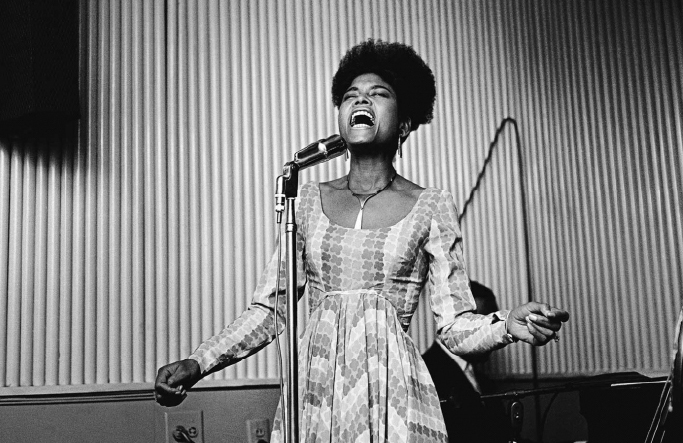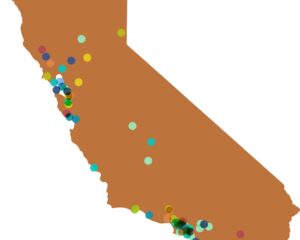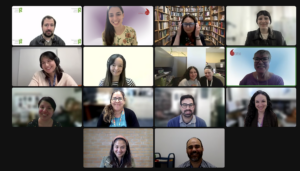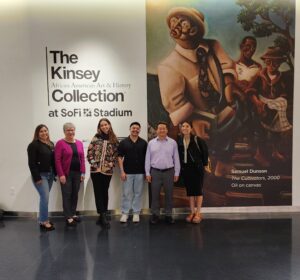February is Black History Month, and we’re taking the opportunity to highlight several California Humanities grant-funded events you can attend across California, from films to exhibits, radio broadcasts to performances, library celebrations, and more.
Film Screenings in San Francisco
At the Museum of the African Diaspora, enjoy film screenings every Wednesday this month as a part of Black is Beautiful: The Black Power & Jazz Film Series. On February 19, see ABBEY LINCOLN IS, about the jazz singer, songwriter, and movie actress Abbey Lincoln who lived her life in a way that demanded respect—as an artist and as a Black woman. Independent curator Ashara Ekundayo and music scholar Angela M. Wellman will introduce the film and lead a post-screening discussion. Then, on February 26, watch MR. SOUL! about the groundbreaking public affairs and entertainment program on public TV hosted by the Visionary Ellis Haizlip that combined talk and performance with poets from the Black Arts Movement such as Nikki Giovanni and Sonia Sanchez, activists like Stokely Carmichael and musical artists such as LaBelle and Ashford and Simpson. Filmmaker Melissa Haizlip will introduce the film and lead a post-screening discussion.
Funded in part by California Humanities’ California Documentary Project grant program, Romeo is Bleeding follows Donté Clark, a young poet growing up in Richmond, California, as he works with students to rewrite and stage an adaptation of Shakespeare’s Romeo and Juliet set in the streets of Richmond. Join a special fundraising event for California Humanities on February 12 with a screening of this film, featuring Donté Clark as a special guest speaker.
Catch another California Humanities-supported documentary on February 1 as a part of the de Young Museum’s Free Saturdays celebration of the exhibition, Soul of a Nation: Art in the Age of Black Power 1963–1983. Join directors Abby Ginzberg and Frank Dawson for a screening of their film AGENTS OF CHANGE, the untold story of the racial inequities on college campuses during the late 60s that led to protests for more relevant and inclusive education. The striking similarities between this pivotal time and our current day confirms how much work still remains to be done.
Black Gold in Siskiyou and Shasta County
In the mountains of Northern California, in Shasta and Siskiyou Counties, one of the largest gold mining events of the 19th century occurred. Within a few years of the first discovery of gold, miners had arrived from all corners of the globe. Among those arriving in the west were a significant number of African Americans. In fact by 1852 over 2,000 men of African American descent were in the California gold fields. However, today little is ever mentioned about the free and enslaved black men and women who lived in the northern California wilderness by pick and shovel. On January 31, the Turtle Bay Museum in Redding unveils their new exhibit, Voices of the Golden Ghosts, focused on the life of African Americans involved in gold mining in the 1850s in Northern California, specifically Siskiyou County. The exhibit includes video interviews with historians and participants. A week later, on February 9, in Weed, an event combining storytelling, theatrical performance, and lecture will reconstruct the lives of these African Americans. Then, on February 20, tune into Jefferson Public Radio for a special interview and discussion of African American miners in the Siskiyous border of California and Oregon in the 1850s. Voices of the Golden Ghosts director Mark and Chelsea Rose of Southern Oregon University’s Anthropology Department will join the hosts to talk about their theatrical piece and museum exhibit around this history.
New Afro-Latino Exhibit Opening in Los Angeles
In the first exhibition of its kind in a major institution, LA Plaza de Cultura y Artes in downtown Los Angeles explores the history and contemporary experiences of Afrolatinidad in the area through art, photographs, and personal objects. In the exhibition, visitors enter a recreated Afro-Latinx home and understand how this vibrant yet underrepresented community is central to Los Angeles culture. On February 22, join LA Plaza as they celebrate the opening with small bites, a live DJ, and a Afro-Peruvian dance performance.
LOS ANGELES—Opening reception: afroLAtinidad: mi casa, my city
Celebrating Neighborhood African American History in West Oakland
Join Commons Archive for a special Thursday evening ‘after-hours’ at North Oakland’s Golden Gate Library on February 13. Hear historian and writer Susan Anderson talk about the East Bay Negro Historical Society, their impact on the Golden Gate Branch and the African American Museum and Library at Oakland, as well as their legacy in Oakland. Experience the Golden Gate Library Local Collection, a new place-based reference series, in specially designed reading chairs crafted from repurposed library furniture. Explore neighborhood stories in larger than life photo and text prints installed on library windows, hallways and even the elevator. Contribute your neighborhood memory to the project’s growing collection of community stories. Enjoy local music from the library’s collection curated by The MERCER Brotherhood. Leo Mercer, a displaced North Oakland neighbor and rap-activist, will share an audio collage created from performances of the Golden Gate Library Summer Jazz Concert series along with local music and neighbor stories.





